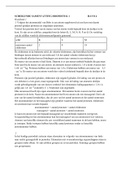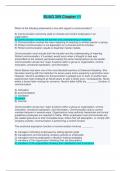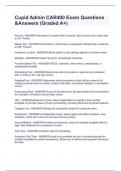the literature
CSR deals with sustainable, responsible, and impact investing (SRI). The return implications of
investing in the stocks of socially responsible firms, the search for an ESG factor as well as the
performance of SRI funds are the dominant topics.
- SR funds apply negative screening, positive screening as well as activism through proxy
voting or direct engagement.
- Questionable whether investors are willing to trade off financial returns with a “moral”
dividend
- Recent study concentrates on green financing (the financing of environmentally friendly
investment projects by means of green bonds), and how to foster economic de-
carbonization as climate change effects financial markets and investor behavior
Paper 2. Bebchuk et al. (2022) Does enlightened shareholder value add value?
● Corporate leaders often face significant trade-offs between shareholder and stakeholder
interests --> corporate purpose important in such situation
● Under certain standard assumptions, SV and ESV are always equivalent and describe the
same corporate choices
● At best, replacing SV with ESV would create neither value nor harm
● The switch from SV to ESV would be detrimental for stakeholders and could impede or delay
reforms that could truly protect them
Paper 3. Liang & Renneboog (2019) On the foundations of corporate social responsibility -->
lecture foundations of CSR short
Question: what fundamental forces steer corporations to behave as good citizens rather than as
pure profit maximizers
Legal origins: english common law, french civil law, German civil law, Scandinavian law, socialist law
● The “Law and finance” view
o Corporate laws address agency conflicts between managers and shareholders, and
between controlling and minority shareholders
o Common law is superior in providing fertile ground for shareholder protection
o Shareholder protection --> financial development --> efficient resource allocation -
-> better economic development and social welfare
● The stakeholder view
o Firm has responsibility to shareholders, but also to broader stakeholders
o Civil laws are superior in providing fertile ground for stakeholder protection
o Stakeholder protection --> reducing market externalities --> social welfare
● The institutional view ( “conventional wisdom”)
o Political institutions shape corporate governance structures and aggregate social
preferences
o To foster CSR and Sustainability: democracy and constraints on government need
to come first
● The development view
o Institutions are the consequence, rather than preconditions, of economic
development
, o Democracy and executive constraints hinder good economic outcomes: difficulty
in consensus building
Results
- Darker color indicates a higher CSR rating
- Firms under the english common law have lower CSR scores in most ESG dimensions than
those under civil law
- Table above shows the Wilcoxon rank-sum test to compare the differences across legal
origins for various aspects of CSR
- Civil law countries consistently score higher than common law countries in all ESG subfields
- Within civil law countries, countries with German legal origin have higher levels of CSR than
their counterparts with French legal origin in terms of ecological and environmental policy,
but the French legal origin firms have higher levels of CSR in social issues and labor relations
than the German companies
- There are systematic differences in various ESG ratings across different legal origins
Robustness check
, - Other CSR sub-dimensions --> results still hold
- Random-effect ordered probit estimation --> results still hold
- Other CSR samples --> results still hold
- Other political institutions variables --> results still hold
o Democracy ranking index
o Economist intelligence Unit (EIU) democracy index
o Freedom house political rights index
- Control for legal protection on investors --> results still hold
o Anti-director rights index
o Anti-self-dealing index
o One-share one-vote
- Control for culture --> results still hold
o Power distance, individualism, uncertainty avoidance
Causality
, ● Quasi-natural experiments and difference-in-difference analysis for causation
o Reaction to 2008 Chinese milk scandal by firms in food-related industries from
different legal regimes (treatment = civil law)
o Corporate donations as a reaction to 2004 Asian Tsunami by firms from different
legal regimes (treatment = civil law)
o Environmental performance upgrade by firms in energy-related industries from
different legal regimes as a reaction to 2010 deepwater horizon oil spill (treatment =
civil law)
Placebo tests
,Panels A&B show the results for product responsibility and environmental performance ratings in
alternative industries, panel c shows the results on corporate donations for alternative years.
- Panel A: the milk scandal had no impact on the non-food industries for firms in civil law
countries --> interaction terms are not statistically significant
o This supports the result sin table 8: firms’ CSR reactions in food safety are specific to
the food industry
- Panel B: the oil spill disaster did not affect other industries in terms of corporate
environmetnal actions after the disaster
- Panel C: interactions between the civil law dummy and alternative years that were not
affected by global disasters are not statistically significant.
o Interaction between civil law dummy with post-disaster year is positive and
significant --> difference in cash donations between common law firms and civil law
firms likely to be triggered by the year-specific disaster event
Economic mechanisms
, Table shows the results of testing potential mechanisms that may explain the link between legal
origin and CSR. Including : shareholder litigation, employment laws, collective relations laws, degree
of state involvement in the economy, supermajority rules
First stage: In the first stage the channel variables are regressed on the civil law dummy
- Civil law negatively correlated with shareholder litigation risk
- Positively with all other variables
Second stage: In the second stage the overall CSR rating is regressed on the channel variable
predicted from the first stage
- Shareholder litigation risk negatively correlated with the level of CSR
- Other channel variables positively correlated
Conclusion: civil law countries rely more heavily on rules-based mechanisms that restrict ex ante and
reflect a stronger focus on stakeholder orientation in these societies. These rule-based mechanisms
are related to higher levels of CSR
Summary:
● Legal origins: only consistent predictors of CSR
o Civil law firms outperform common law firms in CSR issues
o Scandinavian firms outperform the rest of the world in CSR
● Political institutions: mostly insignificant
● Corp gov, fin performance, fin constraint, cultures, etc. --> not strong predictors of CSR
● Policy tradeoff between shareholder protection and stakeholder protection, and between
financial development and societal sustainability
Paper 4. Marquis (2020), The B corp movement goes big










